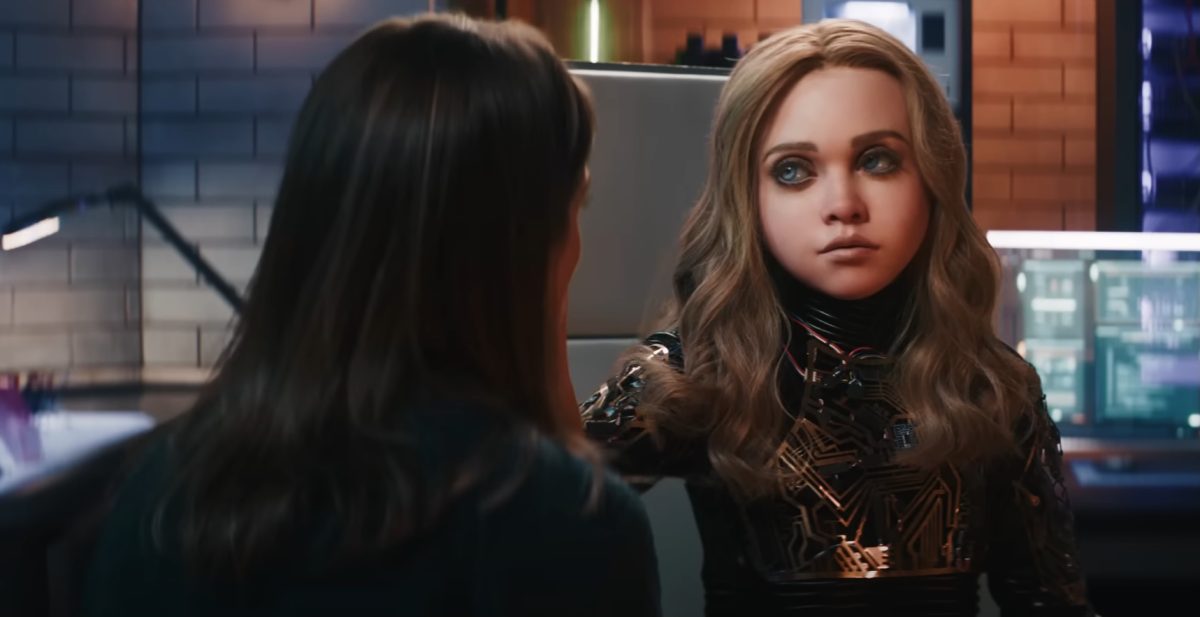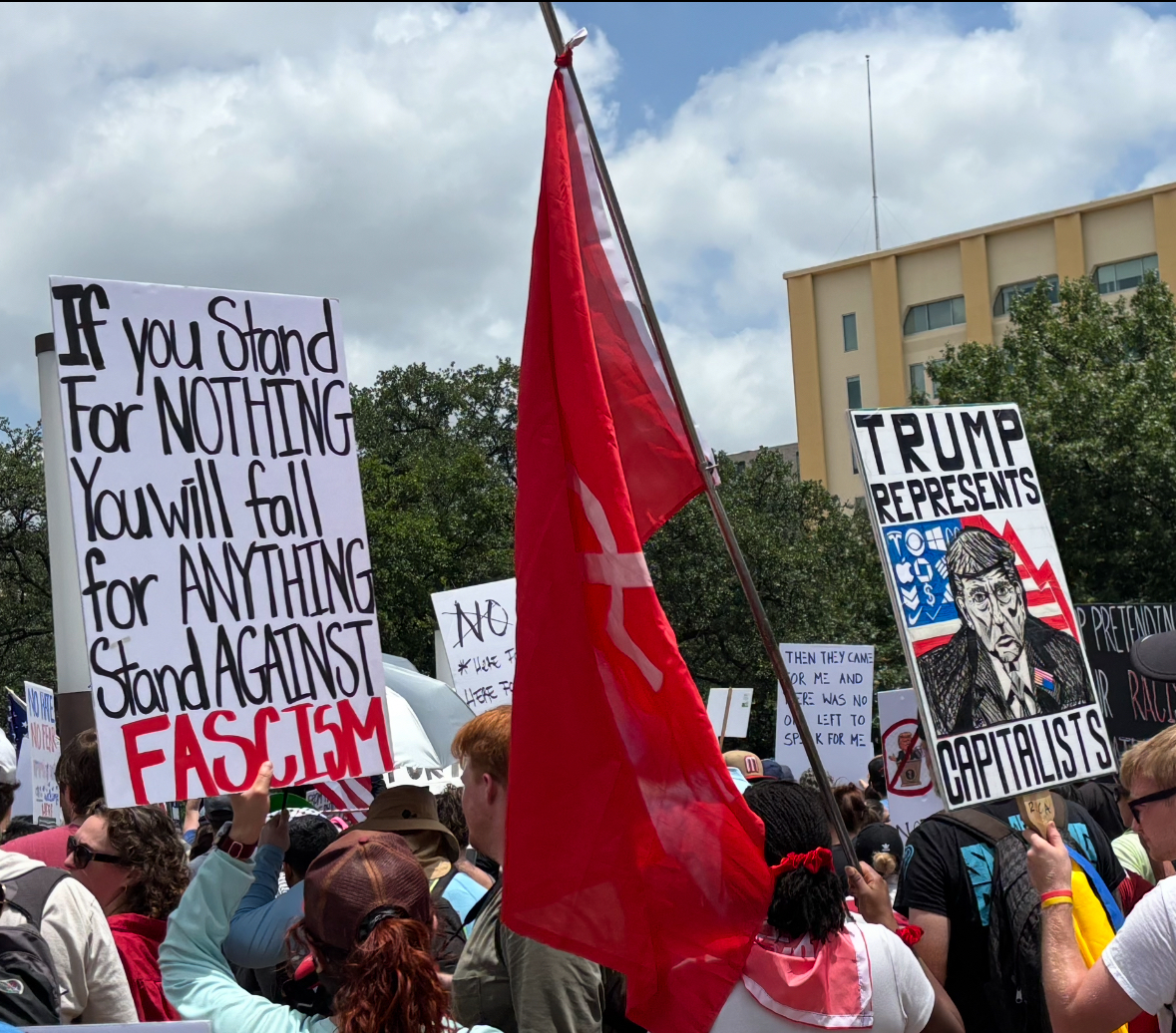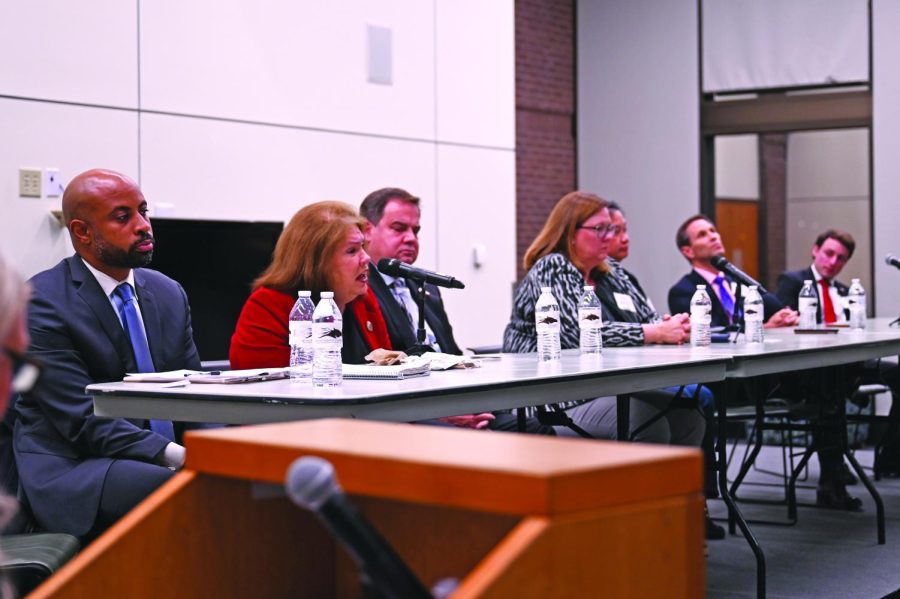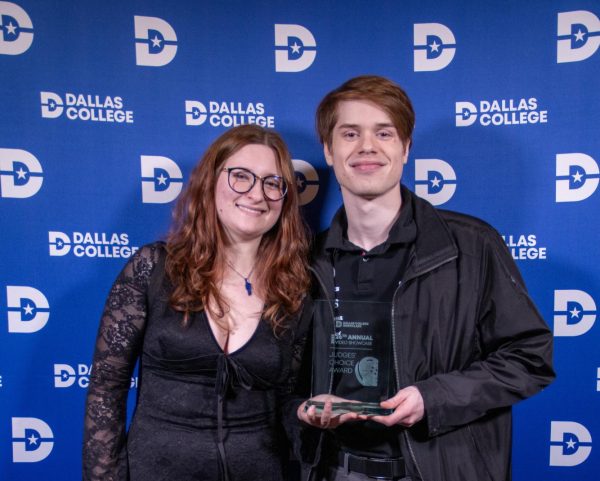NLC host local candidate forum
Local candidates from multiple districts spoke to voters over key issues they all focus on if elected during a public forum hosted at the North Lake Campus.
The League of Women Voters of Irving invited local candidates from different districts to a public forum to address voters about key issues over school curriculum, gun, abortion and more on Oct.18.
Seven candidates in the forum included — Democratic Terry Meza who seeks reelection for Texas House of Representatives in District 105 against Republican Allan Meagher, Democrat Julie Johnson, who seeks reelection for the Texas House of Representatives in District 115, Democrat Francine Ly seeks a seat in Texas State Senate in District 12, Democrat Nathan Johnson seeks reelection for the Texas State Senate in District 16 against Republican Brandon Copeland and In- dependent candidate Alejandro Arrieta seeks a seat for state representative in District 103.
The debate started with each candidate’s opening speech and answered questions about key issues. Later, the moderator incorporated questions from the audience.
The moderator asked the candidates if the state government should regulate the school curriculum. Meza said that teachers feel over regulated and over administrated and that someone is looking over their shoulder constantly, telling them what moves to make.
Ly brought up the fact that she was a child refugee and did not learn English until the age of nine. She said, “I believe that reading is extremely extremely im- portant for children to grow as a person and an individual. When you take that away you stop them from growing. It is up to the qualified educators and their school boards to make decisions. The government doesn’t need to tell them what to do.”
“We need to trust our teachers, and we need to trust our librarians,” Meza said. “We need to believe in them. They don’t do it just for the money.”
Nathan Johnson said that the state should pay teachers more and get politics off their backs. He said that teachers should get paid parental leave.
“They are paid almost nothing,” Na- than Johnson said. “We should not spend money or time on it because we do elect people to do that,” referring to state boards of education.
Arrieta said, “We’ve come to the point where we’re expecting anything and ev- erything from our teachers. We expect them to play security, counselor, teacher and everything in between. I’d like to see more mentors and more parents being involved in the schools.”
The moderator asked candidates about safety in public schools and what gun control measurements they supported.
Nathan Johnson said he supports red flags law, cooling off periods, raising the age from 18 to 21 to buy a firearm, and restoring the permit system and common database for sales to ensure school safety. He also said that finding kids that have mental trouble and changing the culture are fac- tors that could decrease gun violence in Texas.
“Don’t deluge ourselves thinking that a metal detector or pain of glass is going to keep our children safe,” Nathan Johnson said.
On the same issue, Meza said that she believes in the right to defend ourselves from an intruder at home but does not believe the answer to guns is more guns. She told the crowd that universal background checks, red flags law, and raising the age for assault weapons would help decrease gun violence and ensure school safety.
Julie Johnson said, “I am not here to take your guns away, but there has got to be some regulation, such as red f lag laws, more intensive background checks and take an extra three days or a 72 hour hold. I don’t think its outrageous and it’s our kids lives at stake and I be- lieve these little exceptions are worth it.”
Arrieta is also infavor of stricter gun laws. “I’m in favor of background checks and social media checks should be componet as well,” he said. “Another thing I’d like to do is use money from programs such as Title 4D to start training mental health professions and make them available to students and teachers.”
The next question asked whether any elections reforms are needed to protect access to voting and how you can get young voters to the polls be- cause they feel very discouraged.
After arriving late to the event, candidate Copeland briefly introduced himself and said he disagreed with how Texas passed a bill last session, making voting easier.
“The problem is that peo- ple don’t know how to do that, and they don’t know where to go. They have not been educated,” Copeland said.
In terms of voter registration, Meza and Nathan Johnson agreed that voting is not easy or accessible in Texas.
“In Texas, we don’t have a problem with ineligible people voting,” Meza said. “We have a problem with eligible people not being allowed to vote.”
They both said that online voter registration, online voting, expanding access to vote-by-mail, and expanding voting centers are valid solutions to make voting easier and en- courage more people to participate in democracy.
The next question asked was the Supreme Court’s decision to return the abortion issue to the states.
Meza said that she stands by protecting women’s access to reproductive healthcare and that a woman should have the right to make her own healthcare decisions, including family planning.
“I think that we might have an opportunity next legisla- tion because there has been a lot of pushbacks about the
fact that there are no exceptions for rape, no exceptions for incest, no exceptions for the mother’s health,” Meza said.
Nathon Johnson also agreed and said, “I will continue to support the right of women to have an abortion. Abortion should be legal and subject to reasonable regulation. Trigger bills are an abomination.”
Copeland disagreed and was the lone candidate who agreed with the Supreme Court’s decision.
“From the moment of inception, you have a unique human life, and I think is important to protect that life,” Copeland said. “We must pro- tect life.”
Another topic was Mexico’s border; candidates agreed it should be a federal issue, not a state. Nathan Johnson told the crowd that the border was closed and more secure than ever before.
“It is the Texas border, and it requires some Texas dollars, and it requires some Texas law
enforcement, and it is okay to be spending money there. It is appropriate.”
“We should partner with the federal government and partner with Latin American countries to try to manage the situation, building more facilities and treating people better,” Nathan Johnson said.
On the contrary, Copeland said that the border is open, and Texas allowed over two million border encounters in the past year. He also said that the state had increased crime and human trafficking.
Copeland also said more resources, such as law enforcement officers, should be placed on the border to stop the crisis.
Healthcare was also brought into the forum, where candidate Johnson and Republican candidate Copeland clashed and disagreed. Nathan Johnson said expanding Medicaid is a viable solution, whereas Copeland noted that the program is too costly.
Nathan Johnson said five million Texans are unassured, and immigrants are not eligible for Medicaid in Texas. He said Medicaid expansion would pay for itself, save and generate more revenue than we spend insuring people, and increase business productivity.
“It is an absolute no brainer to expand Medicaid,” Nathan Johnson said.
Copeland challenged his opponent’s statement and said the problem is that insurance companies have bad practices and unethical behavior.
“We need to allow more access to private health insurance that is going to be much better and much more comprehensive than any government can provide,” Copeland said.
The last topic discussed was the power grid.
Meza said, “Weatherizing the natural gas wellheads would not only save billions in production revenues, but it will also save lives.”
The general election is on Nov. 8.















